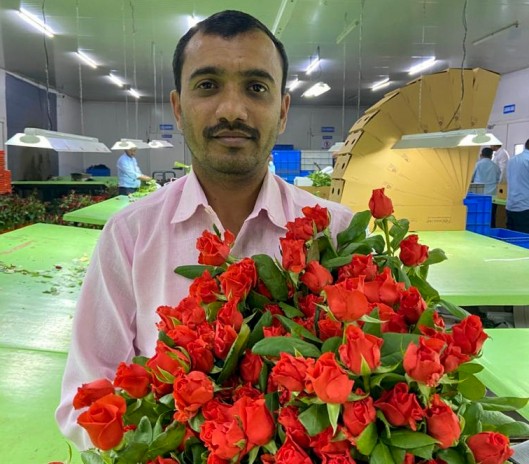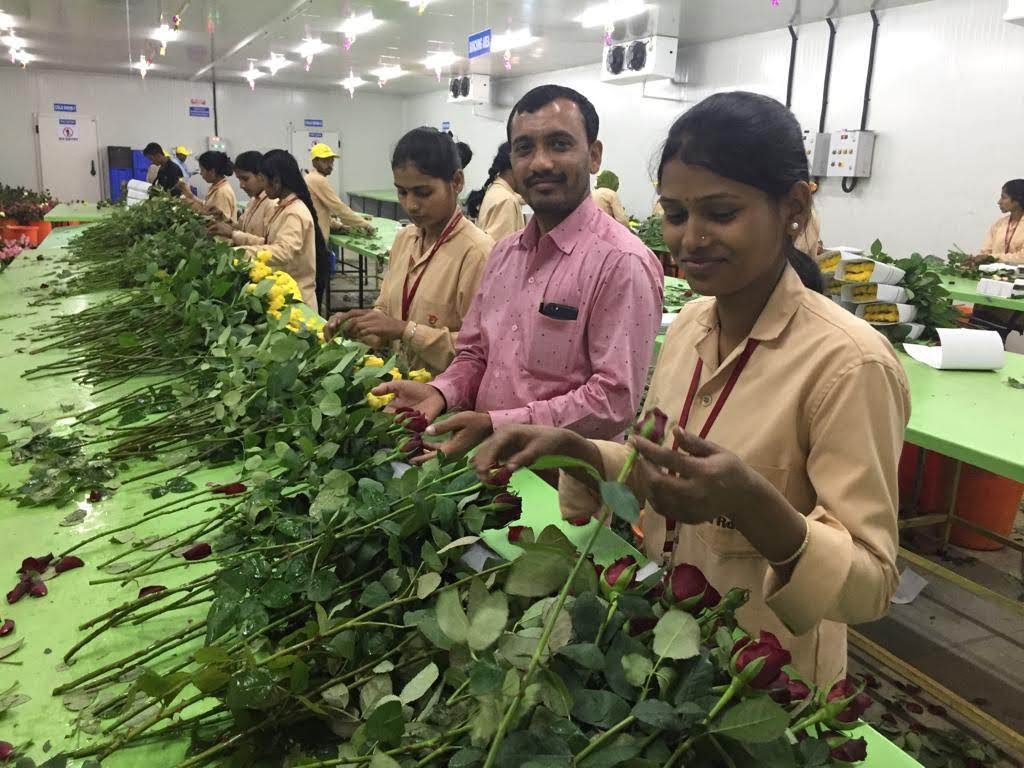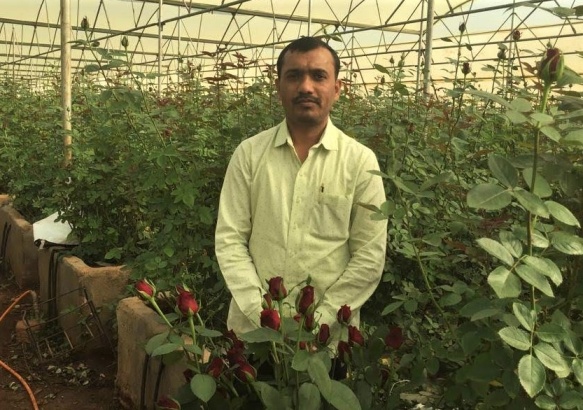Pune Paddy Farmer Switches to Roses, Earns Lakhs Thanks to Bumper Orders
Mukund Thakar, a floriculturist, in Pune's Maval district launched the Pawna Phul Utpadak Sangh, helping farmers diversify their produce and earn in lakhs. Their Valentine's Day consignment is their biggest yet with 7 lakh roses reaching as far as Jammu and Kashmir and Guwahati.

When you think of roses you generally think of carmine red. What you may not know is that their colours come mainly from the pigments called anthocyanins, which are in the class of chemicals called flavonoids. Belonging to the Rosaceae family, the cultivars or siblings are named differently and distinctly — each identified by its colour and their striking appearance.
This Valentine’s Day you’re likely to settle for cut roses while gifting it to your loved one. But did you know the roses have different names, like ‘Top Secret’ for red, ‘Solaire’ for yellow, ‘Rockstar’ for deep coral, ‘Revival’ for pink, ‘Sweet Avalanche’ for creamy pink, ‘Revival’ for light pink, ‘Avalanche’, ‘Jumilia’, ‘Brown Beauty’, ‘Peach Avalanche’… the list goes on.
Mukund Thakar, a successful floriculturist, has a two-acre polyhouse located in Yelse village, part of Pawna Nagar in Pune’s Maval region, which is derived from the Marathi word ‘Maval‘ — meaning the direction in which the sun sets. A hilly terrain and part of the Western Ghats, it was the maiden abode of Chatrapati Shivaji Maharaj who formed an army of the local inhabitants called ‘Mavale’. Here floriculturists growing roses make around Rs 1 lakh a month.
A role model of farmers, Thakar has established a rose growers collective, called Pawna Phul Utpadak Sangh (Pawna Flower Growers Union). Santaji Jadhav, member, Panchayat Samiti, says, “Mukund is a progressive farmer. His initiative has provided jobs to the local youth, both men and women, and stopped migration.”

It is here that we learnt each variety of rose has a secret meaning that could be used to convey how you feel to your sweetheart. “Roses have their own language,” says Thakar, and goes on to explain it in Marathi, “Red rose is a classic choice and means prem (love), white is associated with lagna (marriage) and adhyatam (spirituality), yellow with red tips mean premata padane (falling in love), pink means Kr̥pā āṇi abhijātatā (grace and elegance), a mix of red and white symbolises aikya (unity), peach represents iccha (desire), and if you want to say, Mī tujhyāvara prēma karatō (I love you) with flowers, do it with a bouquet of all shades.”
To make a hub of roses
For years the Thakar family made their livelihood growing paddy and sugarcane besides rearing cattle which wasn’t very lucrative and left them in constant debt. So much so that Thakar discontinued his studies after the 10th standard. In 2005, then a 23-year-old he did a month-long course from the Talegaon-based National Horticulture Centre. He initially set up a polyhouse on a 20 guntha (a half-acre) plot. Over the years his floriculture business has flourished and is now spread on 15 acres with plots taken on lease. He attributes his success to the unstinted support from his family, the banks which provided him loans due to his good credit ratings and hard work.
He goes on to reminiscence how for two years he paid numerous visits to the flower markets located in Mumbai, Pune, Hyderabad and Bangalore to understand the market needs and its dynamics. “A year or two in floriculture I realised that the demand for good quality material outstripped what I could grow,” says the recipient of the Best Farmer of the District Award 2018-2019. “My low scales led to increased costs for fertilizer, pesticides and the horticulture consultant’s fees. But now it’s shared and affordable,” he says.
Having observed Thakar’s success, farmers in the neighbouring farm plots approached him for assistance to diversify which led to the establishment of Pawna Phul Utpadak Sangh (Pawna Flower Growers Union). Established in 2013, the Sangh presently has 13 members with farmers growing roses on 40 acres. Fourteen more farmers are awaiting to join as they complete their formalities for loan and subsidy. According to the Taluka Agriculture Officer, Devendra Dhage, “Maval has emerged as a floriculture hub in the state with around 1300 polyhouses and the numbers are growing each year.”

The rosy picture behind floriculture
Floriculture is a highly resource-intensive enterprise necessitating large investments. For instance, a polyhouse spread on an acre costs around Rs 60 lakhs, of which the farmer receives a subsidy of 50 per cent from the National Horticulture Board. Then, there are costs involved in setting up a cold room, processing centres, etc.
With its brand, Sai Roses, the Sangh does business worth Rs 80,000 daily with flowers reaching places like Jammu and Kashmir, Delhi, Kolkata, Guwahati, Hyderabad, Bangalore, Ahmedabad, among others. “From production to packaging, each member has his job allocated. They make around Rs 1 lakh,” informs Chandrakant Kalekar, a Botany graduate and a Sangh member who besides roses also grows Gerbera on his four-acre plot.

Floriculturists the world over nurse a desire to send their flowers to the developed markets, especially to countries like Holland, Australia and Japan. The Sangh too has been exporting flowers since 2013. Thakar says, “Our Valentine’s Day’s last consignment for Holland leaves on February 8.”
Rose growers of Pawna Nagar look forward to the ‘high season’, namely Valentine’s Day which begins on January 24 and ends on February 8. Last year the Sangh sold 7 lakh roses. But this year due to the effect of the pandemic they are likely to clock only 5 lakh pieces.
For rose growers among our readers, Thakar has these following tips: water your rose plant once in two weeks, no more than 300ml; every sixth month feed it with 5 kilos of dry cow dung, and to prevent pest attack use pesticide (organic or chemical) in the ratio of 5ml for every litre of water.
Asked how do you impress your Valentine? “Go for a 60cm-sized flower bud, one of our best,” concludes Thakar.
(Edited by Yoshita Rao)
If you found our stories insightful, informative, or even just enjoyable, we invite you to consider making a voluntary payment to support the work we do at The Better India. Your contribution helps us continue producing quality content that educates, inspires, and drives positive change.
Choose one of the payment options below for your contribution-
By paying for the stories you value, you directly contribute to sustaining our efforts focused on making a difference in the world. Together, let’s ensure that impactful stories continue to be told and shared, enriching lives and communities alike.
Thank you for your support. Here are some frequently asked questions you might find helpful to know why you are contributing?


This story made me
-
97
-
121
-
89
-
167











